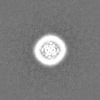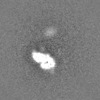[English] 日本語
 Yorodumi
Yorodumi- EMDB-25852: Cryo-EM structure of GluN1b-2B NMDAR in complex with Fab5 in non-... -
+ Open data
Open data
- Basic information
Basic information
| Entry | Database: EMDB / ID: EMD-25852 | |||||||||
|---|---|---|---|---|---|---|---|---|---|---|
| Title | Cryo-EM structure of GluN1b-2B NMDAR in complex with Fab5 in non-active2-like conformation | |||||||||
 Map data Map data | ||||||||||
 Sample Sample |
| |||||||||
 Keywords Keywords | channel / antibody / SIGNALING PROTEIN-IMMUNE SYSTEM complex | |||||||||
| Function / homology |  Function and homology information Function and homology informationpons maturation / positive regulation of Schwann cell migration / regulation of cell communication / EPHB-mediated forward signaling / Assembly and cell surface presentation of NMDA receptors / olfactory learning / dendritic branch / conditioned taste aversion / regulation of respiratory gaseous exchange / protein localization to postsynaptic membrane ...pons maturation / positive regulation of Schwann cell migration / regulation of cell communication / EPHB-mediated forward signaling / Assembly and cell surface presentation of NMDA receptors / olfactory learning / dendritic branch / conditioned taste aversion / regulation of respiratory gaseous exchange / protein localization to postsynaptic membrane / propylene metabolic process / response to glycine / regulation of monoatomic cation transmembrane transport / voltage-gated monoatomic cation channel activity / Synaptic adhesion-like molecules / NMDA glutamate receptor activity / RAF/MAP kinase cascade / parallel fiber to Purkinje cell synapse / NMDA selective glutamate receptor complex / response to morphine / calcium ion transmembrane import into cytosol / glutamate binding / neuromuscular process / protein heterotetramerization / regulation of synapse assembly / positive regulation of calcium ion transport into cytosol / positive regulation of reactive oxygen species biosynthetic process / glycine binding / male mating behavior / regulation of axonogenesis / regulation of dendrite morphogenesis / suckling behavior / startle response / response to amine / monoatomic cation transmembrane transport / regulation of neuronal synaptic plasticity / associative learning / monoatomic cation transport / social behavior / excitatory synapse / ligand-gated monoatomic ion channel activity / positive regulation of excitatory postsynaptic potential / cellular response to glycine / positive regulation of dendritic spine maintenance / Unblocking of NMDA receptors, glutamate binding and activation / cellular response to manganese ion / phosphatase binding / glutamate receptor binding / long-term memory / regulation of neuron apoptotic process / prepulse inhibition / monoatomic cation channel activity / calcium ion homeostasis / glutamate-gated receptor activity / synaptic cleft / response to fungicide / glutamate-gated calcium ion channel activity / presynaptic active zone membrane / dendrite membrane / ligand-gated monoatomic ion channel activity involved in regulation of presynaptic membrane potential / sensory perception of pain / response to amphetamine / ionotropic glutamate receptor signaling pathway / hippocampal mossy fiber to CA3 synapse / positive regulation of synaptic transmission, glutamatergic / regulation of membrane potential / adult locomotory behavior / excitatory postsynaptic potential / learning / synaptic transmission, glutamatergic / synaptic membrane / transmitter-gated monoatomic ion channel activity involved in regulation of postsynaptic membrane potential / postsynaptic density membrane / regulation of long-term neuronal synaptic plasticity / visual learning / calcium channel activity / regulation of synaptic plasticity / terminal bouton / response to organic cyclic compound / cerebral cortex development / memory / synaptic vesicle membrane / response to calcium ion / intracellular calcium ion homeostasis / neuron cellular homeostasis / calcium ion transport / rhythmic process / synaptic vesicle / signaling receptor activity / presynaptic membrane / amyloid-beta binding / protein-containing complex assembly / chemical synaptic transmission / postsynaptic membrane / response to ethanol / negative regulation of neuron apoptotic process / transcription by RNA polymerase II / dendritic spine / postsynaptic density / learning or memory Similarity search - Function | |||||||||
| Biological species |   | |||||||||
| Method | single particle reconstruction / cryo EM / Resolution: 4.45 Å | |||||||||
 Authors Authors | Tajima N / Furukawa H | |||||||||
| Funding support |  United States, 2 items United States, 2 items
| |||||||||
 Citation Citation |  Journal: Nat Commun / Year: 2022 Journal: Nat Commun / Year: 2022Title: Development and characterization of functional antibodies targeting NMDA receptors. Authors: Nami Tajima / Noriko Simorowski / Remy A Yovanno / Michael C Regan / Kevin Michalski / Ricardo Gómez / Albert Y Lau / Hiro Furukawa /  Abstract: N-methyl-D-aspartate receptors (NMDARs) are critically involved in basic brain functions and neurodegeneration as well as tumor invasiveness. Targeting specific subtypes of NMDARs with distinct ...N-methyl-D-aspartate receptors (NMDARs) are critically involved in basic brain functions and neurodegeneration as well as tumor invasiveness. Targeting specific subtypes of NMDARs with distinct activities has been considered an effective therapeutic strategy for neurological disorders and diseases. However, complete elimination of off-target effects of small chemical compounds has been challenging and thus, there is a need to explore alternative strategies for targeting NMDAR subtypes. Here we report identification of a functional antibody that specifically targets the GluN1-GluN2B NMDAR subtype and allosterically down-regulates ion channel activity as assessed by electrophysiology. Through biochemical analysis, x-ray crystallography, single-particle electron cryomicroscopy, and molecular dynamics simulations, we show that this inhibitory antibody recognizes the amino terminal domain of the GluN2B subunit and increases the population of the non-active conformational state. The current study demonstrates that antibodies may serve as specific reagents to regulate NMDAR functions for basic research and therapeutic objectives. | |||||||||
| History |
|
- Structure visualization
Structure visualization
| Movie |
 Movie viewer Movie viewer |
|---|---|
| Structure viewer | EM map:  SurfView SurfView Molmil Molmil Jmol/JSmol Jmol/JSmol |
| Supplemental images |
- Downloads & links
Downloads & links
-EMDB archive
| Map data |  emd_25852.map.gz emd_25852.map.gz | 59.2 MB |  EMDB map data format EMDB map data format | |
|---|---|---|---|---|
| Header (meta data) |  emd-25852-v30.xml emd-25852-v30.xml emd-25852.xml emd-25852.xml | 20.6 KB 20.6 KB | Display Display |  EMDB header EMDB header |
| Images |  emd_25852.png emd_25852.png | 54.6 KB | ||
| Filedesc metadata |  emd-25852.cif.gz emd-25852.cif.gz | 6.9 KB | ||
| Others |  emd_25852_additional_1.map.gz emd_25852_additional_1.map.gz emd_25852_half_map_1.map.gz emd_25852_half_map_1.map.gz emd_25852_half_map_2.map.gz emd_25852_half_map_2.map.gz | 59.4 MB 5.1 MB 5.1 MB | ||
| Archive directory |  http://ftp.pdbj.org/pub/emdb/structures/EMD-25852 http://ftp.pdbj.org/pub/emdb/structures/EMD-25852 ftp://ftp.pdbj.org/pub/emdb/structures/EMD-25852 ftp://ftp.pdbj.org/pub/emdb/structures/EMD-25852 | HTTPS FTP |
-Validation report
| Summary document |  emd_25852_validation.pdf.gz emd_25852_validation.pdf.gz | 695 KB | Display |  EMDB validaton report EMDB validaton report |
|---|---|---|---|---|
| Full document |  emd_25852_full_validation.pdf.gz emd_25852_full_validation.pdf.gz | 694.6 KB | Display | |
| Data in XML |  emd_25852_validation.xml.gz emd_25852_validation.xml.gz | 12.4 KB | Display | |
| Data in CIF |  emd_25852_validation.cif.gz emd_25852_validation.cif.gz | 14.6 KB | Display | |
| Arichive directory |  https://ftp.pdbj.org/pub/emdb/validation_reports/EMD-25852 https://ftp.pdbj.org/pub/emdb/validation_reports/EMD-25852 ftp://ftp.pdbj.org/pub/emdb/validation_reports/EMD-25852 ftp://ftp.pdbj.org/pub/emdb/validation_reports/EMD-25852 | HTTPS FTP |
-Related structure data
| Related structure data |  7tetMC 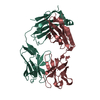 7te4C  7te6C  7te9C  7tebC  7teeC  7teqC  7terC  7tesC C: citing same article ( M: atomic model generated by this map |
|---|---|
| Similar structure data |
- Links
Links
| EMDB pages |  EMDB (EBI/PDBe) / EMDB (EBI/PDBe) /  EMDataResource EMDataResource |
|---|---|
| Related items in Molecule of the Month |
- Map
Map
| File |  Download / File: emd_25852.map.gz / Format: CCP4 / Size: 64 MB / Type: IMAGE STORED AS FLOATING POINT NUMBER (4 BYTES) Download / File: emd_25852.map.gz / Format: CCP4 / Size: 64 MB / Type: IMAGE STORED AS FLOATING POINT NUMBER (4 BYTES) | ||||||||||||||||||||||||||||||||||||||||||||||||||||||||||||||||||||
|---|---|---|---|---|---|---|---|---|---|---|---|---|---|---|---|---|---|---|---|---|---|---|---|---|---|---|---|---|---|---|---|---|---|---|---|---|---|---|---|---|---|---|---|---|---|---|---|---|---|---|---|---|---|---|---|---|---|---|---|---|---|---|---|---|---|---|---|---|---|
| Projections & slices | Image control
Images are generated by Spider. | ||||||||||||||||||||||||||||||||||||||||||||||||||||||||||||||||||||
| Voxel size | X=Y=Z: 1.37 Å | ||||||||||||||||||||||||||||||||||||||||||||||||||||||||||||||||||||
| Density |
| ||||||||||||||||||||||||||||||||||||||||||||||||||||||||||||||||||||
| Symmetry | Space group: 1 | ||||||||||||||||||||||||||||||||||||||||||||||||||||||||||||||||||||
| Details | EMDB XML:
CCP4 map header:
| ||||||||||||||||||||||||||||||||||||||||||||||||||||||||||||||||||||
-Supplemental data
-Additional map: sharpened
| File | emd_25852_additional_1.map | ||||||||||||
|---|---|---|---|---|---|---|---|---|---|---|---|---|---|
| Annotation | sharpened | ||||||||||||
| Projections & Slices |
| ||||||||||||
| Density Histograms |
-Half map: #1
| File | emd_25852_half_map_1.map | ||||||||||||
|---|---|---|---|---|---|---|---|---|---|---|---|---|---|
| Projections & Slices |
| ||||||||||||
| Density Histograms |
-Half map: #2
| File | emd_25852_half_map_2.map | ||||||||||||
|---|---|---|---|---|---|---|---|---|---|---|---|---|---|
| Projections & Slices |
| ||||||||||||
| Density Histograms |
- Sample components
Sample components
-Entire : GluN1b-2B NMDAR complexed to Fab5
| Entire | Name: GluN1b-2B NMDAR complexed to Fab5 |
|---|---|
| Components |
|
-Supramolecule #1: GluN1b-2B NMDAR complexed to Fab5
| Supramolecule | Name: GluN1b-2B NMDAR complexed to Fab5 / type: complex / ID: 1 / Parent: 0 / Macromolecule list: all |
|---|---|
| Source (natural) | Organism:  |
-Macromolecule #1: Glutamate receptor ionotropic, NMDA 1
| Macromolecule | Name: Glutamate receptor ionotropic, NMDA 1 / type: protein_or_peptide / ID: 1 / Number of copies: 2 / Enantiomer: LEVO |
|---|---|
| Source (natural) | Organism:  |
| Molecular weight | Theoretical: 96.944891 KDa |
| Recombinant expression | Organism:  |
| Sequence | String: MSTMHLLTFA LLFSCSFARA ASDPKIVNIG AVLSTRKHEQ MFREAVNQAN KRHGSWKIQL QATSVTHKPN AIQMALSVCE DLISSQVYA ILVSHPPTPN DHFTPTPVSY TAGFYRIPVL GLTTRMSIYS DKSIHLSFLR TVPPYSHQSS VWFEMMRVYN W NHIILLVS ...String: MSTMHLLTFA LLFSCSFARA ASDPKIVNIG AVLSTRKHEQ MFREAVNQAN KRHGSWKIQL QATSVTHKPN AIQMALSVCE DLISSQVYA ILVSHPPTPN DHFTPTPVSY TAGFYRIPVL GLTTRMSIYS DKSIHLSFLR TVPPYSHQSS VWFEMMRVYN W NHIILLVS DDHEGRAAQK RLETLLEERE SKSKKRNYEN LDQLSYDNKR GPKAEKVLQF DPGTKNVTAL LMEARELEAR VI ILSASED DAATVYRAAA MLDMTGSGYV WLVGEREISG NALRYAPDGI IGLQLINGKN ESAHISDAVG VVAQAVHELL EKE NITDPP RGCVGNTNIW KTGPLFKRVL MSSKYADGVT GRVEFNEDGD RKFAQYSIMN LQNRKLVQVG IYNGTHVIPN DRKI IWPGG ETEKPRGYQM STRLKIVTIH QEPFVYVKPT MSDGTCKEEF TVNGDPVKKV ICTGPNDTSP GSPRHTVPQC CYGFC IDLL IKLARTMQFT YEVHLVADGK FGTQERVQNS NKKEWNGMMG ELLSGQADMI VAPLTINNER AQYIEFSKPF KYQGLT ILV KKEIPRSTLD SFMQPFQSTL WLLVGLSVHV VAVMLYLLDR FSPFGRFKVN SQSESTDALT LSSAMWFSWG VLLNSGI GE GAPRSFSARI LGMVWAGFAM IIVASYTANL AAFLVLDRPE ERITGINDPR LRNPSDKFIY ATVKQSSVDI YFRRQVEL S TMYRHMEKHN YESAAEAIQA VRDNKLHAFI WDSAVLEFEA SQKCDLVTTG ELFFRSGFGI GMRKDSPWKQ QVSLSILKS HENGFMEDLD KTWVRYQECD SRSNAPATLT CENMAGVFML VAGGIVAGIF LIFIEIAYKS RA UniProtKB: Glutamate receptor ionotropic, NMDA 1 |
-Macromolecule #2: Glutamate receptor ionotropic, NMDA 2B
| Macromolecule | Name: Glutamate receptor ionotropic, NMDA 2B / type: protein_or_peptide / ID: 2 / Number of copies: 2 / Enantiomer: LEVO |
|---|---|
| Source (natural) | Organism:  |
| Molecular weight | Theoretical: 98.79782 KDa |
| Recombinant expression | Organism:  |
| Sequence | String: MGTMRLFLLA VLFLFSFARA TGWSHPQFEK GGGSGGGSGG SAWSHPQFEK GALVPRGRSQ KSPPSIGIAV ILVGTSDEVA IKDAHEKDD FHHLSVVPRV ELVAMNETDP KSIITRICDL MSDRKIQGVV FADDTDQEAI AQILDFISAQ TLTPILGIHG G SSMIMADK ...String: MGTMRLFLLA VLFLFSFARA TGWSHPQFEK GGGSGGGSGG SAWSHPQFEK GALVPRGRSQ KSPPSIGIAV ILVGTSDEVA IKDAHEKDD FHHLSVVPRV ELVAMNETDP KSIITRICDL MSDRKIQGVV FADDTDQEAI AQILDFISAQ TLTPILGIHG G SSMIMADK DESSMFFQFG PSIEQQASVM LNIMEEYDWY IFSIVTTYFP GYQDFVNKIR STIENSFVGW ELEEVLLLDM SL DDGDSKI QNQLKKLQSP IILLYCTKEE ATYIFEVANS VGLTGYGYTW IVPSLVAGDT DTVPSEFPTG LISVSYDEWD YGL PARVRD GIAIITTAAS DMLSEHSFIP EPKSSCYNTH EKRIYQSNML NRYLINVTFE GRDLSFSEDG YQMHPKLVII LLNK ERKWE RVGKWKDKSL QMKYYVWPRM CPETEEQEDD HLSIVTLEEA PFVIVESVDP LSGTCMRNTV PCQKRIISEN KTDEE PGYI KKCCKGFCID ILKKISKSVK FTYDLYLVTN GKHGKKINGT WNGMIGEVVM KRAYMAVGSL TINEERSEVV DFSVPF IET GISVMVSRSN GTVSPSAFLE PFSACVWVMM FVMLLIVSAV AVFVFEYFSP VGYNRSLADG REPGGPSVTI GKAIWLL WG LVFNNSVPVQ NPKGTTSKIM VSVWAFFAVI FLASYTANLA AFMIQEEYVD QVSGLSDKKF QRPNDFSPPF RFGTVPNG S TERNIRNNYA EMHAYMGKFN QRGVDDALLS LKTGKLDAFI YDAAVLNYMA GRDEGCKLVT IGSGKVFAST GYGIAIQKD SGWKRQVDLA ILQLFGDGEM EELEALWLTG ICHNEKNEVM SSQLDIDNMA GVFYMLGAAM ALSLITFISE HLFYWQFRHS FMG UniProtKB: Gliding motility protein GldL |
-Macromolecule #3: Fab5 heavy chain
| Macromolecule | Name: Fab5 heavy chain / type: protein_or_peptide / ID: 3 / Number of copies: 2 / Enantiomer: LEVO |
|---|---|
| Source (natural) | Organism:  |
| Molecular weight | Theoretical: 23.844684 KDa |
| Sequence | String: DVKLQESGGG SVKLGGSLKL SCVVSGFTFS TYYMSWVRQT PEKRLELVAV INSNGGNTYY PDNVKGRFTI SRDNAENTLY LQMSSLKSE DTALYYCARR DYDGFAMDYW GQGTSVTVSS AKTTPPSVYP LAPGSAAQTN SMVTLGCLVK GYFPEPVTVT W NSGSLSSG ...String: DVKLQESGGG SVKLGGSLKL SCVVSGFTFS TYYMSWVRQT PEKRLELVAV INSNGGNTYY PDNVKGRFTI SRDNAENTLY LQMSSLKSE DTALYYCARR DYDGFAMDYW GQGTSVTVSS AKTTPPSVYP LAPGSAAQTN SMVTLGCLVK GYFPEPVTVT W NSGSLSSG VHTFPAVLQS DLYTLSSSVT VPSSTWPSET VTCNVAHPAS STKVDKKIVP RDC |
-Macromolecule #4: Fab5 light chain
| Macromolecule | Name: Fab5 light chain / type: protein_or_peptide / ID: 4 / Number of copies: 2 / Enantiomer: LEVO |
|---|---|
| Source (natural) | Organism:  |
| Molecular weight | Theoretical: 23.121395 KDa |
| Sequence | String: DIQLTQSPAS LAVSLGQRAT ISCRASQSVS TSRYSYMHWY QHKPGQPPKL LIKYASNLES GVPARFSGSG SGTDFTLNIH PVEEEDTAT YYCQHSWENP YTFGGGTKLE IKRADAAPTV SIFPPSSEQL TSGGASVVCF LNNFYPKDIN VKWKIDGSER Q NGVLNSWT ...String: DIQLTQSPAS LAVSLGQRAT ISCRASQSVS TSRYSYMHWY QHKPGQPPKL LIKYASNLES GVPARFSGSG SGTDFTLNIH PVEEEDTAT YYCQHSWENP YTFGGGTKLE IKRADAAPTV SIFPPSSEQL TSGGASVVCF LNNFYPKDIN VKWKIDGSER Q NGVLNSWT DQDSKDSTYS MSSTLTLTKD EYERHNSYTC EATHKTSTSP I |
-Experimental details
-Structure determination
| Method | cryo EM |
|---|---|
 Processing Processing | single particle reconstruction |
| Aggregation state | particle |
- Sample preparation
Sample preparation
| Buffer | pH: 7.5 |
|---|---|
| Vitrification | Cryogen name: ETHANE |
- Electron microscopy
Electron microscopy
| Microscope | FEI TITAN KRIOS |
|---|---|
| Image recording | Film or detector model: GATAN K3 BIOQUANTUM (6k x 4k) / Average electron dose: 60.0 e/Å2 |
| Electron beam | Acceleration voltage: 300 kV / Electron source:  FIELD EMISSION GUN FIELD EMISSION GUN |
| Electron optics | Illumination mode: OTHER / Imaging mode: OTHER / Nominal defocus max: 3.0 µm / Nominal defocus min: 1.5 µm |
| Experimental equipment |  Model: Titan Krios / Image courtesy: FEI Company |
- Image processing
Image processing
| Startup model | Type of model: NONE |
|---|---|
| Final reconstruction | Resolution.type: BY AUTHOR / Resolution: 4.45 Å / Resolution method: FSC 0.143 CUT-OFF / Number images used: 74886 |
| Initial angle assignment | Type: ANGULAR RECONSTITUTION |
| Final angle assignment | Type: MAXIMUM LIKELIHOOD |
 Movie
Movie Controller
Controller


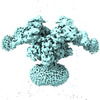






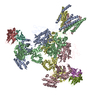
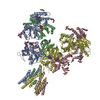
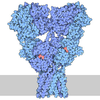

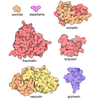
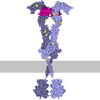
 Z (Sec.)
Z (Sec.) Y (Row.)
Y (Row.) X (Col.)
X (Col.)








